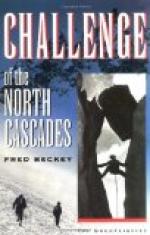“‘More than that,’ he answers, without battin’ an eye. ’But—what’s the matter with the Wolverine?’
“‘The Wolverine?’ I busted out. ’Young man, if I was to tell you what I think of the Wolverine here on the street, I’d be arrested before I’d got good an’ started.’
“‘Better come inside, then,’ he grins, an’ I followed him into a little box of a private office. ‘Of course,’ I says later, when I’d told him what I wanted, ‘most of my collateral is pine timber, an’ I suppose, as Orcutt says, it’s depreciated——’
“‘Depreciated?’ he asks. ‘Why has it depreciated? It’s all standin’ on end, ain’t it?’ he says. An’ it ain’t gettin’ no smaller, is it? An’ they’re layin’ down the pine a damn sight faster than God Almighty can grow it, ain’t they?’ An’ when I admitted that such was the facts, he laughed. ‘Well then, we’ll just go over your reports an’ estimates, an’ I don’t think we’ll have any trouble about doin’ business.’
“An we never have had no trouble, an’ we’ve been doin’ business every day since.”
“But the coat?” reminded Hedin, after an interval of several minutes.
“I’m coming to that. Orcutt ain’t human, but his wife is. When he found out I’d slipped out of his clutches an’ swung all my business over to Bronson’s bank he never by so much as a word or a look let on that he even noticed it. They still have an account at the store; they can’t help it, because no other store in Terrace City keeps the stock we do. But Mrs. Orcutt does all her real shoppin’ in New York or Chicago.”
II
Oskar Hedin loved fur, and the romance of fur. From his earliest recollection he had loved it as he had curled up and listened to the stories of his father, a great upstanding Viking of a sailor man, who year after year had forced his little vessel into the far North where he traded with the natives, and who had lost his life in the ice floes of the frozen sea while sailing with Nordenskjold.
Furs were to Hedin an obsession; they spoke a language he knew. He hated the grosser furs, as he loved the finer. He despised the trade tricks and spurious trade names by which the flimsiest of furs are foisted upon the gullible purchasers of “seal,” “sable,” “black fox,” “ermine,” and “beaver.” He prided himself that no misnamed fur had ever passed over his counter, and in this he was backed up by his employer. The cheaper furs were there, but they sold under their true names and upon their merits.
In the social democracy of the town of twenty thousand people Oskar Hedin had earned a definite place. After graduating from the local high school he had entered the employ of McNabb, and within a very few years had been promoted to head his department. At the Country Club he could be depended upon to qualify with the first flight in the annual golf tournament, and the “dope” was all upset when he did not play in the finals on the courts. He lived at the city’s only “family hotel,” drove his own modest car, and religiously spent his Sundays on the trout streams.




